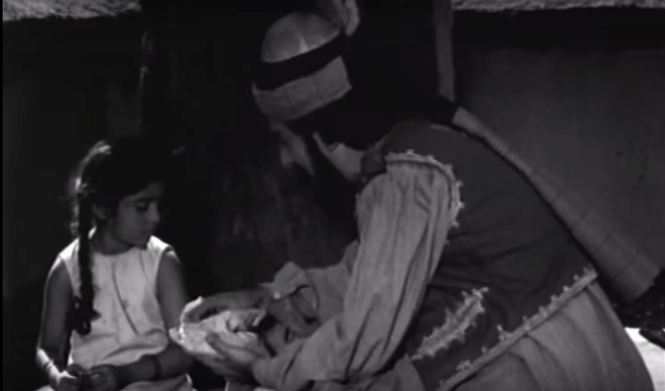For many, childhood memories are shaped by the books we read. Rabindranath Tagore’s stories were some of these defining factors, and Kabuliwala holds a special place on that list. The story of a man with a heart of gold touching the lives of many while making do with his own fate — nobody but Tagore could have written such a poignant tale. Which is why, on his 78th death anniversary, ThePrint looks at the classic tale, which was adapted into a film in 1961.
 For the uninitiated, Kabuliwala tells the tale of Abdul Rehman Khan (played by Balraj Sahni), a poor goat herder living in Kabul, Afghanistan. Want of money forces him to leave his young daughter and old mother behind and travel to India. In Kolkata, much like many of the migrants from Afghanistan, he walks around selling dry fruit and other goods imported from his country. While children run away from the ‘scary’ Kabuliwala, one young girl, Mini, dares to befriend him. Reminded of his own daughter, Abdul returns to see her every day, telling her stories and giving her gifts. Mini’s father is a writer and befriends him as well, despite his wife’s scepticism. But the world is not always kind to outsiders, and soon, tensions rise that create problems for Abdul and threaten his relationship with Mini.
For the uninitiated, Kabuliwala tells the tale of Abdul Rehman Khan (played by Balraj Sahni), a poor goat herder living in Kabul, Afghanistan. Want of money forces him to leave his young daughter and old mother behind and travel to India. In Kolkata, much like many of the migrants from Afghanistan, he walks around selling dry fruit and other goods imported from his country. While children run away from the ‘scary’ Kabuliwala, one young girl, Mini, dares to befriend him. Reminded of his own daughter, Abdul returns to see her every day, telling her stories and giving her gifts. Mini’s father is a writer and befriends him as well, despite his wife’s scepticism. But the world is not always kind to outsiders, and soon, tensions rise that create problems for Abdul and threaten his relationship with Mini.
Above everything else, Kabuliwala is a tale of a father and his love for his daughter. Abdul’s adoration for his own daughter, and the way he spoils her is endearing to watch. When he transfers that affection to Mini, it is equal parts adorable and heart-breaking, as you are constantly reminded that he is away from his daughter for a long time, simply because he can’t earn enough in his homeland. Mini’s relationship with her father is also equally well explored. The sentiment of being torn between admonishing her for her naughtiness and encouraging her curiosity — something most parents would relate to — is well captured in this film.
Directed by Hemen Gupta, the film also a great commentary on the pain of being an outsider and being away from home. It is a kind of fear and discrimination that all immigrants face. Feared by children because their parents perpetuate a convenient myth of being kidnapped by the Kabuliwala, Abdul also faces jingoism in other forms, when he is looked down upon or kept at an arm’s length, because he is not Indian. He is also the one who is instantly suspected when anything goes wrong. But he endures it all, in order to earn some money and take care of his family — just like any other immigrant.
Although the film is more dramatised than the original story, it still has the same effect that Tagore intended. You feel for Abdul and Mini, who are both personifications of innocence and purity, but misfortune doesn’t discriminate between innocent and evil. And after the major political events of this week, Kabuliwala is the film to watch to remind us to be kind to each other.
Also read: An IAF pilot, a love triangle & Raj Kapoor: Why Sangam is a Bollywood hit even after 50 yrs







Great article about a great film. Another great stands silently; Tapan Sinha’s ‘Kabuliwala’ (1957) with Chabi Biswas as Rehman and Sharmila Tagore’s sister Tinku Thakur as Mini. Must see.